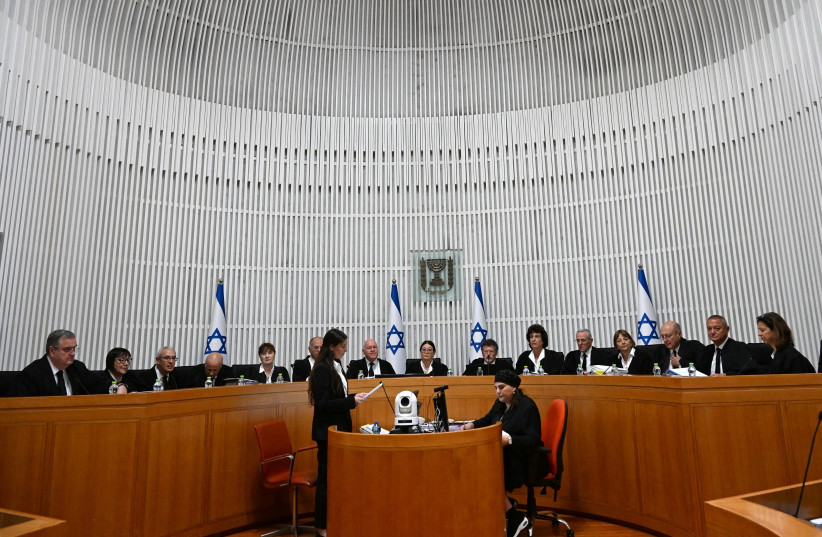Tuesday’s High Court of Justice hearing, with all 15 justices presiding together for the first time to hear arguments for and against striking down the judicial reform’s reasonableness standard law, was a landmark in Israeli history.
The 13-hour hearing on the eight petitions against the law was the culmination of nearly a year of political and legal turmoil for Israel, in which the first and – so far – only judicial reform legislation to pass into law was challenged.
No matter what one’s position on the legislation is, the hearing should only be seen as a celebration of Israeli democracy at its finest.
As Herb Keinon pointed out in Wednesday’s Jerusalem Post, the justices sitting on the Supreme Court represent a balance of conservative and liberal viewpoints. Those attempting to paint it as overwhelmingly left-wing or liberal are simply mistaken or trying to distort the facts.
The court can be divided along the lines of conservative and liberal ideologies, encompassing competing judicial philosophies and worldviews – a cornerstone of any vibrant functioning democracy.

That’s why it’s perplexing and worrisome that coalition leaders are doing everything possible to delegitimize the court as it begins the long, intense deliberations to arrive at a decision on the petitions after Tuesday’s marathon session, during which the justices hear from all sides of the contentious dispute that has torn the country apart.
“The hearing on the possibility of striking down Basic Laws, which are the top of the Israeli legislative pyramid, and the chance of declaring the prime minister incapacitated are a critical blow to the rule of people,” Justice Minister Yariv Levin (Likud) said. “Until now, despite particularly problematic judicial activism, there was at least one agreed-upon basis – the court respected the Basic Laws. This is the base that protected democracy in Israel. The responsibility to protect this common base is now at the door of the court.”
Levin’s partner in the judicial overhaul, Constitution, Law, and Justice Committee chairman Simcha Rothman (Religious Zionist Party), argued that every time the court interfered in the legislation and decisions of the Knesset, it crossed into the auspices of governance and expanded its own power. He said the court doesn’t have the authority to strike down Basic Laws because it overrides the will of the people
Ilan Bombach, the attorney representing the government, Prime Minister Benjamin Netanyahu, and the justice minister, went even further, saying that the signatories of the Declaration of Independence were not representative of the populace, so they had no authority to establish something that would be a constitution. The court’s own authority came from the constituent authority’s Basic Laws, which it shouldn’t be able to review, he said.
The justices challenged Rothman and Bombach, asking what prevented the parliament from passing undemocratic laws, such as those limiting the voting power of the people.
“Democracy dies in small steps”
Warning that an undemocratic movement may not be immediately recognized, Justice Yitzhak Amit said democracy doesn’t usually die all at once, but rather, “democracy dies in small steps.”
That is the crux of the matter. At one time in Israel’s history, perhaps it would have been unthinkable that the Knesset would pass draconian legislation that would take away, for example, the rights of certain citizens to vote.
However, we’ve witnessed Israel’s government being invaded by parties and ministers who, without the checks and balances safeguarded by the court, could very well enact such odious legislation. That’s the reason why hundreds of thousands of Israelis have taken to the streets every Saturday night for 36 weeks.
It could take weeks or months for the justices to arrive at a ruling. And when that eventually arrives, one thing is sure – half of Israel will not be satisfied.
Members of the coalition have already said they will not honor a court ruling that strikes down the judicial reform’s reasonableness standard law, which would launch Israel into an unprecedented constitutional crisis. Likewise, if the court upholds the law, the protests could intensify, and events on the ground could spin out of control.
Now is the time, before either of those scenarios rears its ugly head, for the political parties to reach a compromise on the judicial reform debate and enable the country to start healing. We urge them to do so without delay.
